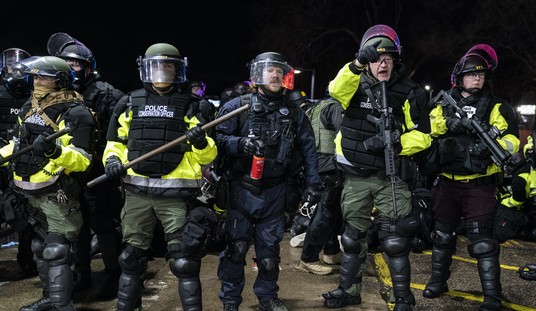
Former Supreme Court Justice John Paul Stevens has an op-ed in the New York Times today where he agrees that the case against firearms made by a crew of ill-bred cretinous teens is so powerful that the Second Amendment should be abolished.
There is a lot wrong with the article. The errors are so glaring that it is hard to attribute them to mere carelessness and not to a deliberate attempt to deceive.
Concern that a national standing army might pose a threat to the security of the separate states led to the adoption of that amendment, which provides that “a well regulated militia, being necessary to the security of a free state, the right of the people to keep and bear arms, shall not be infringed.” Today that concern is a relic of the 18th century.
I’m not sure this is entirely true. And by entirely true, I mean true in any respect. Congress did have a fear of a standing army, a fear they inherited from the British experience with Cromwell’s military dictatorship. In fact, the U. S. Constitution copies part of the British Mutiny Act in that it forbids any appropriation to the military for a period longer than two years:
To raise and support Armies, but no Appropriation of Money to that Use shall be for a longer Term than two Years;
In common with British law, no such restriction was applied to the Navy. At the time the U. S. Constitution was ratified, the strength of the U. S. Army was about 700 men in a single regiment. Hardly a threat. The Second Amendment is more properly seen as an alternative means for national defense that did not involve a standing army rather than as a check and balance against an army that did not actually exist.
What firearms ownership was inextricably tied to, however, was citizenship. In Dred Scott, one of the proofs used by Roger Taney to declare that blacks could never be citizens of the United States was the fact that they were forbidden from owning arms in several states.
Another of the early laws of which we have spoken is the first militia law, which was passed in 1792 at the first session of the second Congress. The language of this law is equally plain and significant with the one just mentioned. It directs that every “free able-bodied white male citizen” shall be enrolled in the militia. The word white is evidently used to exclude the African race, and the word “citizen” to exclude unnaturalized foreigners, the latter forming no part of the sovereignty, owing it no allegiance, and therefore under no obligation to defend it. The African race, however, born in the country, did owe allegiance to the Government, whether they were slave or free, but it is repudiated, and rejected from the duties and obligations of citizenship in marked language.
…
It would give to persons of the negro race, who were recognised as citizens in any one State of the Union, the right to enter every other State whenever they pleased, singly or in companies, without pass or passport, and without obstruction, to sojourn there as long as they pleased, to go where they pleased at every hour of the day or night without molestation, unless they committed some violation of law for which a white man would be punished; and it would give them the full liberty of speech in public and in private upon all subjects upon which its own citizens might speak; to hold public meetings upon political affairs, and to keep and carry arms wherever they went. And all of this would be done in the face of the subject race of the same color, both free and slaves, and inevitably producing discontent and insubordination among them, and endangering the peace and safety of the State.
https://twitter.com/ProfDBernstein/status/978361603144986624
Correct. Not only is the right outlined in Dred Scott’s execrable “parade of horribles,” but as Adam Winkler points out, the forces behind the 14th Amendment were also clear about what the Amendment meant and that it must apply equally. https://t.co/pF3w0XMF0y pic.twitter.com/FnNlxfrV61
— Charles C. W. Cooke (@charlescwcooke) March 27, 2018
For over 200 years after the adoption of the Second Amendment, it was uniformly understood as not placing any limit on either federal or state authority to enact gun control legislation. In 1939 the Supreme Court unanimously held that Congress could prohibit the possession of a sawed-off shotgun because that weapon had no reasonable relation to the preservation or efficiency of a “well regulated militia.”
Again, there is scant history to indicate this is true. In fact, what makes Stevens’s entire argument suspect is his mangling of the Miller decision.
C'mon, man, you know that's not what it said. It was NOT WITHIN JUDICIAL NOTICE whether there was such a relationship, because no one showed up to represent the guys accused of breaking the law. https://t.co/JLUtyyLNQT pic.twitter.com/QcVE09cV97
— Robert VerBruggen (@RAVerBruggen) March 27, 2018
Actual language. pic.twitter.com/3X2fLRwFRu
— Robert VerBruggen (@RAVerBruggen) March 27, 2018
Btw, here's Scalia batting down Stevens's similar misuse of Miller in the actual Heller decision. pic.twitter.com/3zsamkiCn1
— Robert VerBruggen (@RAVerBruggen) March 27, 2018
In fact, properly read, the Miller decision allows for the banning of sawed-off shotguns because they, in the opinion of the court, are of no use to a militia. This implies that a weapon that is useful to a militia is home free.
While we’re here, let’s digress a bit to the stupid “weapons of war” argument. In 1787, 100% of all weapons were “weapons of war.” The reason the Constitution doesn’t parse out certain weapons as illicit is because there was no such belief. In fact, the Constitution clearly implies that private ownership of what would have been “weapons of war” was not only contemplated but counted upon. Article I, Section 8 gives Congress the power to, “grant Letters of Marque and Reprisal.” This meant the commissioning of privateers, i.e. privately owned ships armed with cannon. In fact, most ships of the era carried cannon for both self-defense and signaling. As you go forward in history, there is no point at which government sought to prevent private citizens from owning any kind of weapon they wished. In fact, on the frontier of the 1870s, your typical farmer had a more potent rifle than that carried by the U. S. Army. It wasn’t until submachine guns were outlawed in 1934 that the federal fetish with gun control laws began.
Justice Antonin Scalia demolished all of Stevens’ sad anti-gun tropes in the Heller decision, which now stands as the law of the land.
Stevens’s wishcasting and hand-waving aside, there is damned little chance that the Second Amendment will be repealed. The idea of repealing part of the Bill of Rights, the amendments that made ratification of the Constitution possible, should be abhorrent to any American. Because if the Second is up for grabs, nothing protects the other nine.
But, as we saw on Saturday, the future of the nation is quite possibly in the hands of people with no respect for or even knowledge of our history and institutions. We can’t afford to not take them seriously because they are dangerous. And we can’t negotiate with them because they are idiots.














Join the conversation as a VIP Member